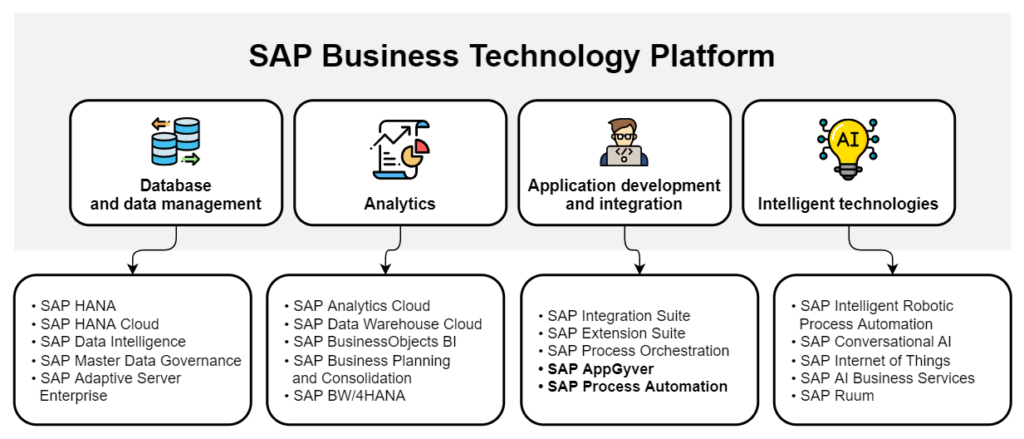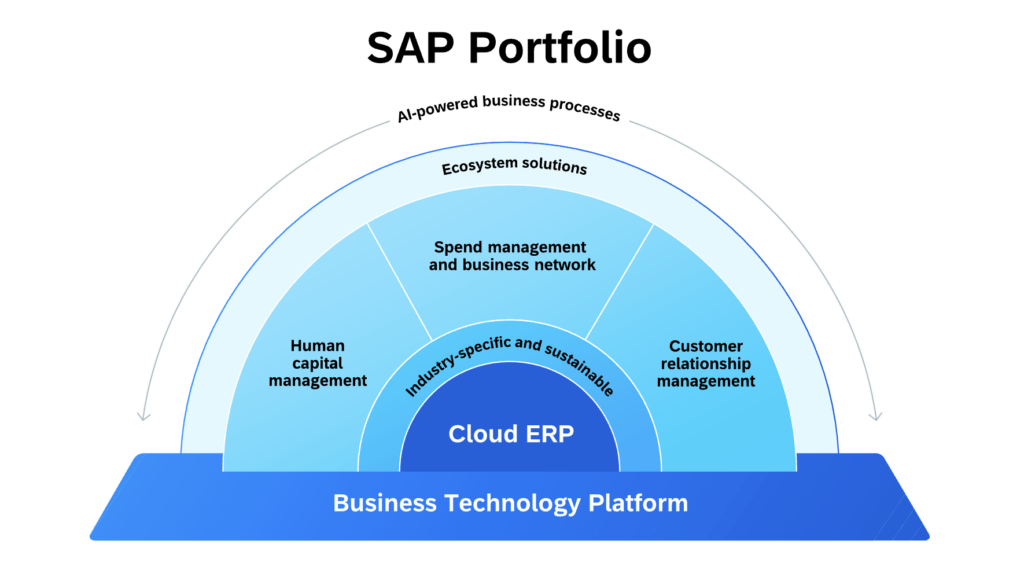Understanding SAP Business Technology Platform
In today’s digital landscape, businesses must constantly adapt to technological advancements to stay competitive. SAP Business Technology Platform (SAP BTP) is a comprehensive solution designed to help enterprises navigate digital transformation effectively. It combines data management, artificial intelligence (AI), analytics, and application development into a unified environment, providing organizations with the tools they need to innovate and optimize operations.
SAP BTP serves as a foundation for companies aiming to enhance their enterprise applications, automate processes, and integrate diverse systems. By leveraging cloud-based solutions and advanced analytics, businesses can gain deeper insights, make informed decisions, and accelerate growth.
SAP BTP is not just a collection of tools; it is a strategic enabler that empowers organizations to build intelligent enterprises.
Key Capabilities of SAP BTP
Data Management and Integration
Data is the backbone of any enterprise, and managing it effectively is crucial for business success. SAP BTP provides a robust framework for handling data across various environments, including on-premise, cloud, and hybrid infrastructures.

One of the most powerful components of SAP BTP is SAP HANA Cloud, a high-performance database that enables real-time data processing and advanced analytics. Businesses can store and analyze vast amounts of structured and unstructured data, ensuring that insights are always current and relevant.
Additionally, SAP BTP includes SAP Integration Suite, which facilitates seamless connectivity between applications, whether they are SAP or non-SAP solutions. This ensures smooth data flow across different systems, eliminating silos and improving operational efficiency.
A well-integrated data landscape allows enterprises to break down silos, improve collaboration, and drive more effective decision-making.
Advanced Analytics and Business Intelligence
In the age of big data, businesses need more than just raw information—they need actionable insights. SAP BTP includes SAP Analytics Cloud, a powerful tool that combines business intelligence, predictive analytics, and planning capabilities.
With SAP Analytics Cloud, organizations can create interactive dashboards, visualize key performance indicators (KPIs), and leverage machine learning to forecast future trends. This empowers decision-makers to move from reactive to proactive strategies, mitigating risks before they become significant issues.
Companies in industries such as retail, manufacturing, and finance use SAP BTP’s analytics capabilities to optimize supply chains, detect fraud, and personalize customer experiences. By integrating AI-driven analytics, businesses can continuously refine their operations and improve overall efficiency.
Application Development and Extension
Enterprises often require custom applications to meet specific business needs. SAP BTP enables developers to create, modify, and extend applications with flexibility and efficiency. The platform supports various development environments, including SAP Business Application Studio and SAP Fiori, to facilitate the creation of responsive and user-friendly applications.
One of the key advantages of SAP BTP is its support for low-code and no-code development. This means that even non-technical users can participate in the development process, building applications through intuitive drag-and-drop interfaces. This accelerates innovation and reduces dependency on IT teams.
With SAP BTP, businesses can quickly adapt to changing requirements by developing and deploying applications that align with their unique operational goals.
Artificial Intelligence and Automation
AI is a transformative force in modern enterprises, and SAP BTP integrates AI-powered capabilities to enhance business processes. The platform includes SAP AI Core and AI Foundation, which provide the necessary infrastructure for building and deploying machine learning models.
These AI solutions can be embedded into existing business applications to automate repetitive tasks, enhance decision-making, and improve customer experiences. Common use cases include predictive maintenance, automated customer support, and demand forecasting.
For example, in manufacturing, AI-powered sensors can predict equipment failures before they happen, reducing downtime and maintenance costs. In finance, AI-driven fraud detection algorithms can analyze transaction patterns to identify suspicious activities in real time.
By integrating AI into enterprise workflows, SAP BTP enables businesses to enhance efficiency, reduce costs, and gain a competitive edge in their industries.
Real-World Use Cases of SAP BTP
Enhancing Supply Chain Management
Modern supply chains are complex and require real-time visibility to operate efficiently. SAP BTP provides businesses with tools to track shipments, monitor supplier performance, and predict potential disruptions.
By leveraging real-time data analytics, businesses can improve demand forecasting, optimize inventory management, and enhance logistics coordination. AI-powered predictive analytics allow organizations to anticipate delays and take proactive measures to mitigate risks.

Automating Financial Processes
Financial teams often deal with repetitive and time-consuming tasks such as invoice processing, reconciliation, and compliance reporting. SAP BTP helps automate these processes using AI and machine learning, improving accuracy and efficiency.
By integrating SAP BTP with SAP S/4HANA Finance, businesses can reduce manual intervention, minimize errors, and speed up financial close processes. Additionally, AI-powered analytics help CFOs and finance teams make data-driven decisions.
Personalizing Customer Experiences
Customer expectations are higher than ever, and businesses must deliver personalized experiences to remain competitive. SAP BTP enables organizations to analyze customer behavior, segment audiences, and provide tailored recommendations.
Retailers use AI-driven insights to predict purchasing patterns and offer personalized promotions. In the telecommunications industry, SAP BTP helps companies optimize call center operations and improve customer service through automated chatbots and intelligent virtual assistants.
Driving Sustainability Initiatives
Many organizations are prioritizing sustainability and environmental responsibility. SAP BTP supports sustainability initiatives by providing data-driven insights into energy consumption, carbon emissions, and resource usage.
For example, manufacturers can use SAP BTP to track their carbon footprint and implement energy-efficient production strategies. Retailers can optimize supply chains to reduce waste and improve sustainability compliance.
The Future of SAP BTP
As businesses continue their digital transformation journeys, SAP BTP will play an increasingly critical role in driving innovation. Its combination of AI, analytics, application development, and integration capabilities makes it a cornerstone for intelligent enterprises.
The future of SAP BTP will likely include further advancements in AI-driven automation, deeper cloud integrations, and expanded support for industry-specific solutions. As SAP continues to invest in its technology ecosystem, businesses will gain even greater opportunities to optimize processes and unlock new revenue streams.
SAP BTP is not just a technological investment—it’s a long-term strategic asset that enables businesses to thrive in an ever-evolving digital economy.







